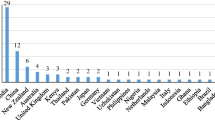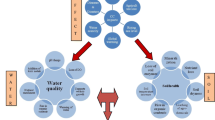Abstract
Groundwater availability in upland villages in southern India has reduced drastically during the last two decades. Most farmers believe this is entirely due to the decrease in rainfall. The current work presents participatory system dynamics modeling of crop-water-income dynamics and root cause analysis in one such village to quantify the long-term effects of groundwater withdrawal and other agricultural practices. Groundwater overexploitation was identified as the most significant cause of the crisis. Causal loop diagrams, stocks and flows diagrams, and scenario analysis were developed through focused group discussions and individual meetings with stakeholders. Multiple 'what-if' scenarios suggested by stakeholders were simulated and analyzed. Notably, less water-intensive, chemical-free farming emerged as an ecologically and economically sustainable strategy. A post-project survey indicated that 90% of stakeholders felt that the framework enhanced their understanding of the problem, encouraged unbiased exploration of new ideas, and raised their commitment to subsequent action plans. It is an easily replicable framework for adoption by farmers and policymakers to address the groundwater crisis and promote sustainable farming practices.









Similar content being viewed by others
Availability of Data and Materials
All relevant data are included in the paper or its Supplementary Information.
References
Andualem TG, Demeke GG, Ahmed I, Dar MA, Yibeltal M (2021) Groundwater recharge estimation using empirical methods from rainfall and streamflow records. J Hydrol Reg Stud 37:100917. https://doi.org/10.1016/j.ejrh.2021.100917
Bajany DM, Zhang L, Xu Y et al (2021) Optimisation approach toward water management and energy security in arid/semiarid regions. Environ Process 8:1455–1480. https://doi.org/10.1007/s40710-021-00537-9
Biancalani R, Marinelli M (2021) Assessing SDG indicator 6.4. 2 “level of water stress” at major basins level. UCL Open Environ 1–17. https://doi.org/10.14324/111.444/ucloe.000026
Central Ground Water Board (CGWB-2017) Report on aquifer mapping for sustainable management of ground water resources in chittoor district andhra pradesh. Ministry Of Water Resources, River Development and Ganga Rejuvenation, Government of India. http://cgwb.gov.in/AQM/NAQUIM_REPORT/AP/Chittoor.pdf (downloaded on 17 May 2022 3:13pm)
Central Ground Water Board (CGWB-2020) G. o. I., Ministry of Water Resources (2020) Groundwater yearbook 2019–20. http://cgwb.gov.in/Ground-Water/GW%20YEAR%20BOOK%202019-20%20ALL%20INDIA%20FINAL%20752021%20(1).pdf (downloaded on 06 Jan 2022 6:15pm)
Chen Z, Wei S (2014) Application of system dynamics to water security research. Water Resour Manag 28(2):287–300. https://doi.org/10.1007/s11269-013-0496-8
Duddigan S, Collins CD, Hussain Z, Osbahr H, Shaw LJ, Sinclair F, Ann Winowiecki L (2022) Impact of zero budget natural farming on crop yields in Andhra Pradesh. SE India Sustainability 14(3):1689. https://doi.org/10.3390/su14031689
FAO (2021) The state of the world's land and water resources for food and agriculture – systems at breaking point. Synthesis report 2021. Rome, Italy. https://doi.org/10.4060/cb7654en (Accessed on 30 Mar 2022 3:30pm)
Forrester JW (1989) The beginnings of system dynamics. Banquet Talk at the International Meeting of the System Dynamics Society 1–16
Gorripati R, Thakur M, Kolagani N (2022) A framework for optimal rank identification of resource management systems using probabilistic approaches in analytic hierarchy process. Water Policy 24(6):878–898. https://doi.org/10.2166/wp.2022.236
Gray S, Voinov A, Paolisso M, Jordan R, BenDor T, Bommel P, Glynn P, Hedelin B, Hubacek K, Introne J, Kolagani N, Laursen B, Prell C, Schmitt-Olabisi L, Singer A, Sterling E, Zellner M (2018) Purpose, processes, partnerships, and products: 4Ps to advance participatory socio-environmental modeling. Ecol Appl 28(1):46–61. https://doi.org/10.1002/eap.1627 (https://esajournals.onlinelibrary.wiley.com/doi/full/10.1002/eap.1627)
Kolagani N, Ramu P (2016) A participatory framework for developing public participation GIS solutions to improve resource management systems. Int J Geogr Inf Sci 31(3):463–480. https://doi.org/10.1080/13658816.2016.1206202 (http://www.tandfonline.com/doi/abs/10.1080/13658816.2016.1206202?journalCode=tgis20)
Kolagani N, Ramu P, Varghese K (2015) Participatory model calibration for improving resource management systems: Case study of rainwater harvesting in an Indian village. JAWRA J Am Water Resour Assoc 51(6):1708–1721. https://doi.org/10.1111/1752-1688.12351 (http://onlinelibrary.wiley.com/doi/10.1111/1752-1688.12351/abstract)
Kotir JH, Smith C, Brown G, Marshall N, Johnstone R (2016) A system dynamics simulation model for sustainable water resources management and agricultural development in the Volta River Basin, Ghana. Sci Total Environ 573:444–457. https://doi.org/10.1016/j.scitotenv.2016.08.081
Malik YR, Sheikh MS, Yousaf S (2021) Probability and sampling in dentistry. In (Ed.), Clinical Concepts and Practical Management Techniques in Dentistry. IntechOpen. https://doi.org/10.5772/intechopen.97705
Mashaly AF, Fernald AG (2020) Identifying capabilities and potentials of system dynamics in hydrology and water resources as a promising modeling approach for water management. Water 12(5):1432. https://doi.org/10.3390/w12051432
Maskrey SA, Mount NJ, Thorne CR, Dryden I (2016) Participatory modelling for stakeholder involvement in the development of flood risk management interventions options. Environ Modell Softw 82:275–294. https://doi.org/10.1016/j.envsoft.2016.04.027
Mayer A, Vivoni ER, Kossak D, Halvorsen KE, Morua AR (2017) Participatory modeling workshops in a water-stressed basin result in gains in modeling capacity but reveal disparity in water resources management priorities. Water Resour Manag 31(15):4731–4744. https://doi.org/10.1007/s11269-017-1775-6
Momeni M, Behzadian K, Yousefi H, Zahedi S (2021) A scenario-based management of water resources and supply systems using a combined system dynamics and compromise programming approach. Water Resour Manag 35(12):4233–4250. https://doi.org/10.1007/s11269-021-02942-z
National Rainfed Area Authority (2011) Common guidelines for watershed development projects-2008: revised edition-2011. National Rainfed Area Authority, Planning Commission, Government of India, New Delhi, India. 59 pp. https://dolr.gov.in/sites/default/files/Common%20Guidelines%20for%20WDP%202008%20Revised%20Edition%202011.pdf (downloaded on 06 Jan 2022 8:15pm)
Pahalvi HN, Rafiya L, Rashid S, Nisar B, Kamili AN (2021) Chemical fertilizers and their impact on soil health. In Microbiota and Biofertilizers, Vol 2 (pp. 1–20). Springer, Cham. https://link.springer.com/chapter/10.1007/978-3-030-61010-4_1
Samadi-Foroushani M, Keyhanpour MJ, Musavi-Jahromi SH, Ebrahimi H (2022) Integrated water resources management based on water governance and water-food-energy nexus through system dynamics and social network analyzing approaches. Water Resour Manag 1–21. https://doi.org/10.1007/s11269-022-03343-6
Sinha (2020) Report on 20 agro ecological regions of India. International Development Enterprises (India). https://www.ide-india.org/sites/default/files/20%20agro%20ecological%20regions%20of%20India.pdf (downloaded on 22 May 2022 11:30am)
Solana-Gutiérrez J, Rincón G, Alonso C, García-de-Jalón D (2017) Using fuzzy cognitive maps for predicting river management responses: a case study of the Esla River Basin. Spain Ecol Model 360:260–269. https://doi.org/10.1016/j.ecolmodel.2017.07.010
Vensim PLE (2022) Vensim 9.0.1 [Computer software]. downloaded from https://vensim.com/ on 20 June 2022, 6:30 pm
Voinov A (2017) Participatory Modeling for Sustainability. Encycl Sustain Technol 33–39. https://doi.org/10.1016/B978-0-12-409548-9.10532-9
Winz I, Brierley G, Trowsdale S (2009) The use of system dynamics simulation in water resources management. Water Resour Manag 23:1301–1323. https://doi.org/10.1007/s11269-008-9328-7
Acknowledgements
We sincerely thank all stakeholders for their active participation and valuable inputs. We thank the India Meteorological Department (IMD) Government of India for providing rainfall data and Azim Premji Philanthropic Initiatives (APPI) for their support in conducting the workshops with stakeholders. Lastly, we are deeply grateful to Prof. Uma Garimella for her invaluable help in this project.
Funding
This work was supported by Government of India projects: 1) SPARC/2018–19/P1080/SL and 2) DST/ICPS/CPS-Individual/2018/778(C).
Author information
Authors and Affiliations
Contributions
Conceptualization, fieldwork, and analysis were performed by Ravi Gorripati and Nagesh Kolagani. Mainak Thakur contributed to methodology, results, and discussion. All authors reviewed and approved the final manuscript.
Corresponding author
Ethics declarations
Ethical Approval
There are no relevant waivers or approvals.
Consent to Participate
Authors consent to their participation in the entire review process.
Consent to Publish
Authors are giving consent to publish the article in the submitted journal.
Competing Interests
There is no competing or conflict of interest.
Additional information
Publisher's Note
Springer Nature remains neutral with regard to jurisdictional claims in published maps and institutional affiliations.
Supplementary Information
Below is the link to the electronic supplementary material.
Rights and permissions
Springer Nature or its licensor (e.g. a society or other partner) holds exclusive rights to this article under a publishing agreement with the author(s) or other rightsholder(s); author self-archiving of the accepted manuscript version of this article is solely governed by the terms of such publishing agreement and applicable law.
About this article
Cite this article
Gorripati, R., Thakur, M. & Kolagani, N. Promoting Climate Resilient Sustainable Agriculture Through Participatory System Dynamics with Crop-Water-Income Dynamics. Water Resour Manage 37, 3935–3951 (2023). https://doi.org/10.1007/s11269-023-03533-w
Received:
Accepted:
Published:
Issue Date:
DOI: https://doi.org/10.1007/s11269-023-03533-w




